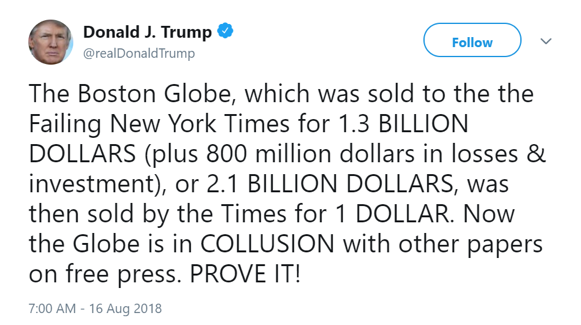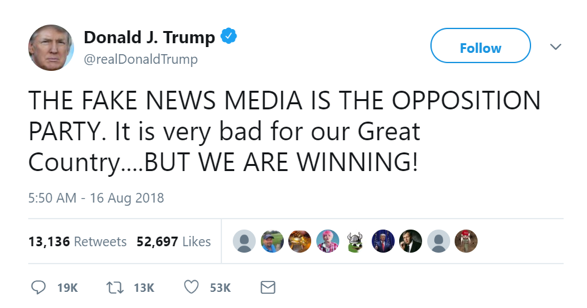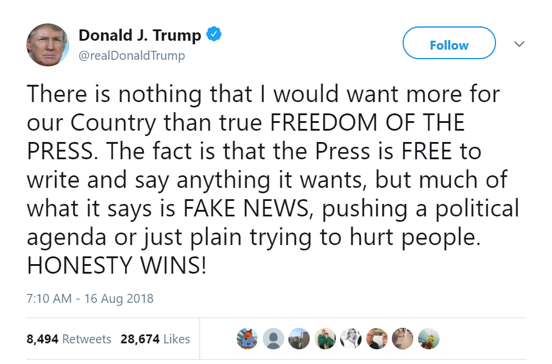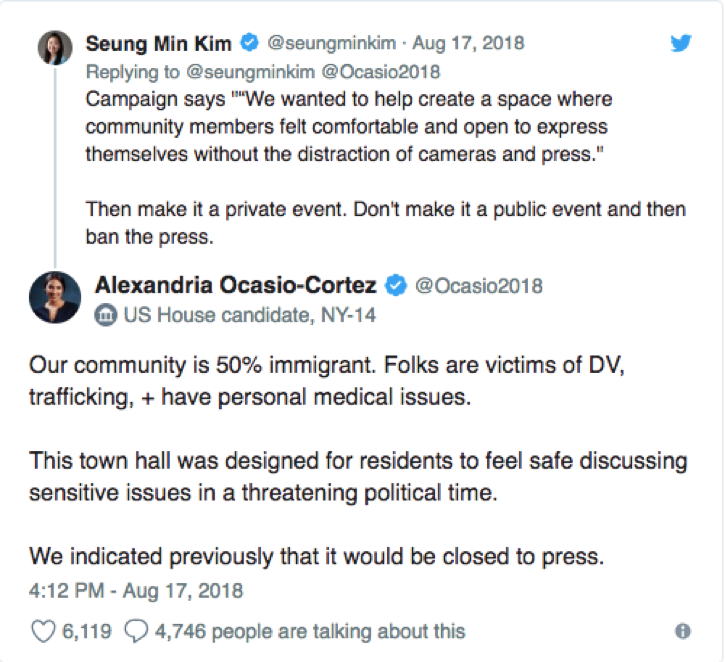US - #WeeklyAddress: August 13 - August 20: Nearly 350 newspapers denounce Trump's anti-media rhetoric
Below are the most notable incidents regarding threats to press freedom in the US during the week of August 13 - August 20:
Nearly 350 newspapers denounce Trump’s anti-media rhetoric
Nearly 350 US news organizations published editorials on August 16 condemning President Donald Trump’s continued attacks on the free press. Newspapers from all over the country participated in the editorial campaign, which was spearheaded by The Boston Globe, including some that had endorsed President Trump after his electoral victory in November 2016. Amid the president’s many attacks on the press and the editorial campaign, the Senate passed a resolution that same day affirming the press is not “the enemy of the people” and cementing the “indispensable role of the free press.” For more on the editorial initiative, read RSF’s publication in support of the editorial campaign.
Boston Globe receives several threats following publication of editorials
The Boston Globe received several threats, including a bomb threat, on August 16, the day the paper led a nation-wide editorial campaign denouncing President Trump’s anti-media rhetoric. The Globe increased security for the remainder of the day, and a spokeswoman for the paper said in a statement that the “alarming turn of the president’s rhetoric … does cause us concern about media outlets and the stories we have heard around the country.” Boston police protected the property until the threat passed, which was “specific to later that afternoon,” according to an email from the Globe’s building manager.
Trump calls “FAKE NEWS MEDIA” the “OPPOSITION PARTY” on day of Boston Globe editorial campaign President Trump accused The Boston Globe, which spearheaded a nationwide editorial campaign denouncing his attacks on the free press, of being in “collusion” with “other papers on free press” in a series of August 16 tweets.

President Trump also referred to the “fake news media” as the “opposition party.”

This is iterative of his previous claims that outlets critical of him were the “enemy of the people” who cause war and division. Later that same day, President Trump also claimed the “fake news” was “pushing a political agenda or just plain trying to hurt people.”

In addition to President Trump’s tweets on August 16, his re-election campaign released its 5th media accountability survey. It contains questions similar to those issued in the most recent survey, which was published July 16. After completing the survey, a donation page read: “The Fake News Media is out to get us. This is a fight we can’t afford to lose.”
NSA compromised VPN of Al Jazeera
The National Security Agency (NSA) broke the encryption of certain “high potential” virtual private networks (VPN) including the news outlet Al Jazeera, according to a March 2006 NSA document that became publicly available on August 15. A VPN protects the user’s privacy by allowing users to remotely access their private networks, leading to concerns about just how secure those networks are. The German newspaper Der Spiegel reported in 2013 that the NSA was secretly monitoring Al Jazeera but didn’t mention that the NSA compromised the VPN of the international publication. This incident is reminiscent of a controversy in 2013 when federal investigators secretly seized two months of phone records from reporters and editors of The Associated Press (AP).
Democratic candidate for Congress Ocasio-Cortez bars press from Town Hall
New York democratic congressional candidate Alexandria Ocasio-Cortez came under fire this week for denying press access to two town hall meetings on August 8 and August 12 which were otherwise open to the public. “Folks are victims of [domestic violence], trafficking + have personal medical issues. This town hall was designed for residents to feel safe discussing sensitive issues in a threatening political time,” she wrote on Twitter after receiving severe backlash from online critics, including many journalists.
She later indicated that future town halls would be open to the press.

Press access at political events has become an increasingly contentious issue across party lines. Most recently, CNN reporter Kaitlan Collins was excluded from a White House Rose Garden event on July 25 for asking an allegedly “inappropriate” question at an Oval Office photo-op.
The United States ranks 45th out of 180 countries in RSF's 2018 World Press Freedom Index after falling 2 places in the last year.
For the latest updates, follow RSF on twitter @RSF_en.



